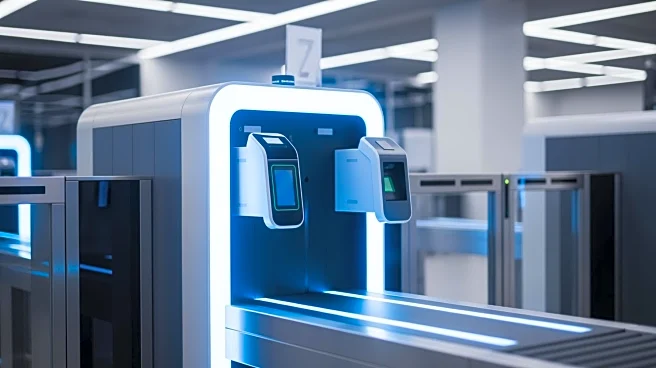What's Happening?
Biometric processing at airports, once met with fear and skepticism, is now preferred by travelers globally. According to a report by Sita, a technology company specializing in air transport, the number
of passengers who have not used biometric technology at airports has decreased from 41% in 2024 to 31% in 2025. This shift is attributed to the growing comfort with biometric identification, which is increasingly used for accessing mobile phones and workplaces. Sarah Samuel, Senior Vice President of Airport and Airline Operations in Asia-Pacific at Amadeus, noted that the expectation for on-demand services, influenced by companies like Uber and Netflix, extends to travel. The technology is particularly popular among younger travelers, men, and frequent flyers, as highlighted in Sita's 2025 Passenger IT Insights report, which surveyed 7,500 passengers across 25 countries.
Why It's Important?
The growing acceptance of biometric processing at airports signifies a shift in consumer behavior towards embracing technology for convenience and efficiency. This trend could lead to faster and more secure airport operations, reducing wait times and enhancing passenger experiences. As biometric technology becomes more integrated into travel, airlines and airports may invest further in these systems, potentially leading to advancements in security protocols and operational efficiency. The demographic preference for biometric technology among younger travelers and frequent flyers suggests a long-term trend that could shape future travel industry standards.
What's Next?
As biometric processing gains popularity, airports and airlines may continue to expand and refine these systems, potentially leading to widespread adoption across more regions. Stakeholders in the travel industry might explore partnerships with technology companies to enhance biometric solutions, ensuring they meet security and privacy standards. Additionally, regulatory bodies may need to address privacy concerns and establish guidelines to protect passenger data, balancing technological advancement with ethical considerations.
Beyond the Headlines
The rise of biometric processing at airports raises important ethical and privacy questions. As travelers become more comfortable with biometric identification, there is a need for robust data protection measures to prevent misuse of personal information. The integration of biometric technology into everyday life could also lead to broader societal changes, influencing how individuals interact with technology and perceive privacy. Long-term, this trend might contribute to a cultural shift towards greater acceptance of digital identities.








